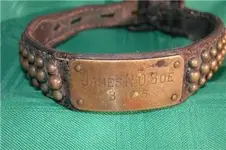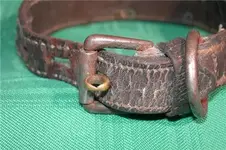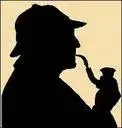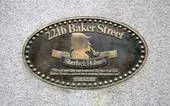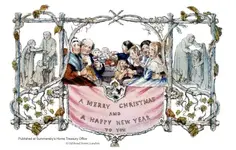These are the final voyages of the starship ...
Oops! Sorry about that. That's the line from a different thread.
What I meant to say is ... These are the final list of thoughts from a blurry eyed detective. And not a very good detective at that. I have yet to solve a single case!
And so I leave you with this personal case file for those who wish to continue the chase.
1. It's "probably" an old dog collar.
2. We may never know how it got "under the floorboards."
Possibilities are:
A. It came off the dog while pursuing something.
B. It was placed there intentionally.
C. It accidently ended up there.
3. The name is "most likely" that of the owner. (But could be the dog's "name.")
4. The B 1815 is either a date - address - phone # - reference # - license #
5. For me, the most curious part of all is the name.
A. Notice that
all of the letters are capitalized.
B. Even the so called lower case ones are capitalized.
C. But the J in James - the N. O. - and the B in Boe are larger. Why?
D. And "if" that's another period after the B. in BOE , then I'm even more
confused!
E.. Something about the N. O. has bothered me from the onset. It just
doesn't strike me as being middle initials, but instead stands for
"New Orleans" or something along those lines.
Last but not least, I want to say it's been a fun investigation, even thought the name etc. have not been fully identified. But this is often the case where there is little else to go on. I also wish to express my thanks to mojjax for unearthing this topic from 2005, and to all who participated in one of the most interesting "What Is It's?" I have been involved with.
Bottom Line? ... I believe it's a dog collar, but remain mystified on the name, etc.
Thanks again,
SODA"GUMSHOE"BOB
Final Post Script: Why do we say "Happy" Thanksgiving - "Happy" Birthday - "Happy" Easter - "Happy" Anniversary - "Happy" New Year, but say "Merry" Christmas?
Answer: "Elementary, my dear Watson. It's because" ...

By the way ... "Merry Christmas"
Signed ... "SureLost" at Home.



